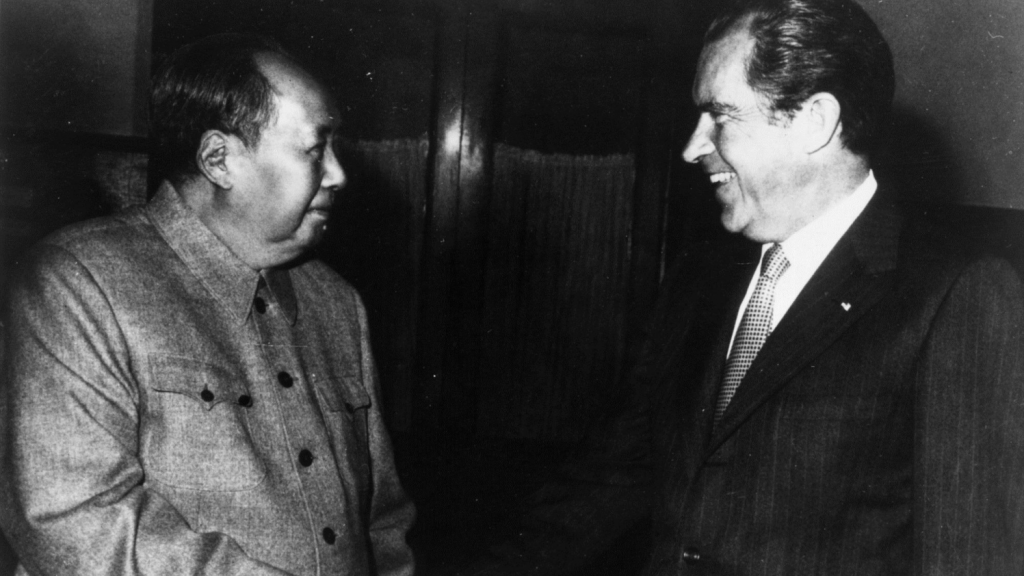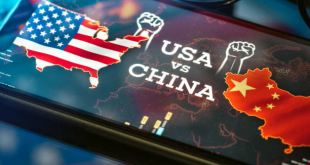Published: February 21,2022
By Stephen Ndegwa

China’s leader Mao Zedong and U.S. President Richard Nixon met to normalize relations between two countries, February 21, 1972. /CFP
This year marks the 50th anniversary of a momentous event that has almost been forgotten due to the unceasing tension between the United States and China. On February 21, 1972, U.S. President Richard Nixon flew to China for a seven-day, three-city tour. Shortly after his arrival in Beijing, he held a meeting with Chinese leader Mao Zedong.
Nixon had reason to revere Chairman Mao due to his revolutionary ideas that set off China to greatness and modernity. Significantly, the latter was the founding father of the People’s Republic of China (PRC).
Nixon understood his host perfectly well. However, it is the fact that both leaders went against the geopolitics of the Cold War that pitted the capitalist West as championed by the U.S. and the Communist East as represented by the Union of Soviet Socialist Republics (USSR) and their respective allies that broke the bounds of the time’s acceptable norms.
But Nixon had psychologically prepared for the trip, and even prepared his citizens for the eventuality. In an interview with Time magazine weeks prior to the trip, Nixon said that “it will be a safer world and a better world if we have a strong, healthy United States, Europe, Soviet Union, China, Japan, each balancing the other.” In short, he believed that mankind is living in a shared destiny.
That statement was evidence that Nixon was anti-hegemony and envisioned the U.S. as an equal partner in the community of nations and not as Big Brother. It is possible that he also foresaw China’s meteoric rise decades before many in the Western bloc did or would admit, and decided to make history by personally ushering the way to full diplomatic relations in 1979.
As the first U.S. president to visit the PRC, Nixon dared the popular opinion prevailing in Washington at the time that saw nothing positive coming out from an attempt at amiable relations with Beijing. Even former U.S. secretary of state and Nixon’s national security adviser, Henry Kissinger, initially saw China as “intransigent” and more hardline than the USSR.
But the rest is history. Unfortunately, this kind of boldness is lacking to solve the political, trade and diplomatic conflict between two of the largest economies and most powerful countries in the world today. But then analysts find that in almost all cases, the onus has been on the U.S., as the aggressor, to make the first move.
Former U.S. Secretary of State Henry Kissinger (Front) speaks during a Senate Armed Services Committee hearing on Capitol Hill in Washington D.C., United States, January 25, 2018. /Xinhua
Apparently, the genie that the U.S. put in a bottle has since gotten out. This lack of initiative or willingness by the U.S. for a permanent rapprochement shows the superpower’s suspicion and insecurity towards a resurgent China. There have been even bolder U.S. presidents after Nixon, like Bill Clinton and Barack Obama, who missed the opportunity to close ranks with their Chinese counterpart. It is ironical because the U.S. has always championed itself as Leader of the Free World and thus takes on the mantle of reconciliation.
Donald Trump failed to follow through on his visit to Beijing in November 2017 with radical proposals that would have moved relations between the two sides forward. He simply enjoyed the ceremony and failed to compromise on his tough stance on various contentious issues, particularly the U.S.-engineered trade spat.
Kissinger is clear on the need for urgently and permanently mending U.S.-China relations the way he was when he held his first historic though secret meeting in Beijing in 1971. In a press conference in July 2021, the former diplomat, who has visited China 100 times since, warned that a war between the two countries “would be an unspeakable catastrophe.”
The U.S. and China should de-escalate the persistent tit-for-tat rhetoric and manipulation, and promote global peace and development. Meanwhile, the window of opportunity for President Joe Biden to make history like his predecessor 50 years ago is fast closing as his first term gets increasingly busy trying to put out fires in every corner of the globe!
Stephen Ndegwa is a Nairobi-based communication expert, lecturer-scholar at the United States International University-Africa, author and international affairs columnist.
 Africa -China Review Africa -China Cooperation and Transformation
Africa -China Review Africa -China Cooperation and Transformation
